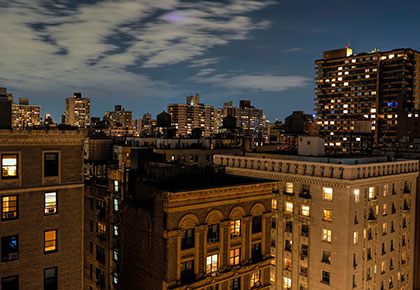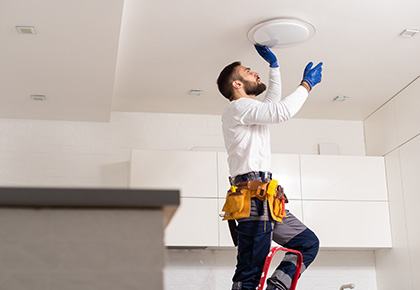-
Best practices to improve HOA financial stability
There’s a lot to love about living in a community with a homeowners association (HOA). The amenities. The sense of belonging. The high aesthetic standards. But none of that happens without stable finances. With that in mind, here’s the bottom line on financial best practices for your HOA. -
Four ways to fund an HOA capital improvement project
Living in a residential community means around-the-clock routine maintenance to preserve the community and its assets. But there comes a time when one of your assets will reach the end of its useful life and require a replacement or significant repairs. -

Enhancing energy benchmarking in condos and co-ops
Condominiums (condos) and cooperative housing communities (co-ops) are increasingly recognizing the importance of sustainability and energy efficiency in today's world. One vital tool that plays a crucial role in this effort is energy benchmarking. -
How the Consumers Price Index (CPI) can impact your HOA
If your community is professionally managed, consult your property management company for more information – a quality firm can leverage its budgeting and financial experience to provide guidance. But to get you started, we’ve compiled some information about the Consumer Price Index – what it is and what you need to consider before you get started. -
How to choose the right HOA banking program
Board members have a fiduciary duty to protect the financial interests of both their homeowners association and fellow residents – and that includes ensuring that their HOA’s operating and reserve funds are properly managed, invested and protected. -
How to plan an effective association budget for your community
Preparing your association’s annual budget...it can be a source of stress, but more importantly, it’s a valuable opportunity to ensure the financial well-being of both your association and homeowners. Proper association management hinges on this financial tool for both short-term and long-term planning, so it’s important to follow some guidelines. -
Six summer energy conservation tips
Summer’s longer days mean more time to enjoy warm weather and sunshine, but they also mean higher energy bills. There is a bright side, however: by implementing an energy management program within your community, you can help keep costs down without sacrificing comfort. -
Three tips for buying in bulk savings
As consumers, we’re familiar with saving money by purchasing products like food and household goods in bulk. But, can this same savings model be applied to the purchases and operational costs of a homeowner association (HOA), condominium or community association? -

What is an HOA master insurance policy?
We know that in the same way we protect ourselves, our assets also carry this significance. That is why HOA master insurance policies are essential for your community, as this type of coverage can help you protect more than just your physical assets. -
Incentives Aim to Green Up New York, Reduce Operating Costs for Building Owners
A recent study found that 75% of greenhouse gasses in New York City are generated by buildings, primarily multifamily residential buildings. As part of a city-wide effort to incentivize buildings to develop programs to curb emissions, FirstService Residential held its Third Annual Green Expo & Symposium on May 15 in New York. The event featured a panel of industry experts, including FirstService Residential President Dan Wurtzel, who described the benefits of participating in city programs, as well as the opportunities to save money, help the environment and enhance property values. -
HOA Pools: The basics of swimming pool insurance
Swimming pools are one of the most common, and most desirable, amenities in communities. Making sure to have proper community pool insurance coverage. -
-

Capital improvements vs repairs and maintenance: What’s the difference?
Maintaining your buildings’ assets is not a one-size-fits-all proposition. The common areas require a broad range of routine maintenance and repairs to keep them looking good and operating smoothly. -
Tips for community waste management in your association
With a growing focus on proper environmental stewardship, many associations are working toward implementing green initiatives. But getting there can be daunting. With so many programs and opportunities available for all of us to reduce, re-use and recycle, it’s hard to know where to begin. -
9 tips about board of directors conflicts of interest
It’s a term that gets tossed around quite a lot. But “conflict of interest” is a real and genuine threat to your association and its proper stewardship. Understanding what the term means – as well as how to recognize and avoid conflicts of interest– can go a long way toward ensuring the strength and stability of your community and eliminating many concerns. -
FirstService Residential Executive Discusses Offbeat Second Home Investment Locations and Trends
While exclusive communities like the Hamptons or Malibu will always be attractive locations for affluent vacation home buyers, several new trends are emerging in the growing second home market. -
Put an Energy Saving Program Together for a Multifamily Property
Many HOAs and community associations would like to save energy and energy spending, but they think that putting an energy management plan into place for their multifamily property is difficult to accomplish. FS Energy's Chris Normandeau explains some basic, easy-to-do steps that can make a real impact on an association's energy usage and budget. -
Hiring a reserve study company: Five things to know
In our guide to capital improvements , reserve studies and their relationship to capital improvements and preventive maintenance were discussed at length. -
Seven tips to finding a reserve study company
Your reserve fund is what helps your association anticipate its future– and budget for it, too. This fund gives you the power to maintain the quality of your community by allowing for projects that are both necessary and expensive (like a future roofing or paving project, for instance). -

5 energy conservation strategies for community associations
In this article, we delve into the significance of energy conservation within community associations, exploring its benefits and strategies for effective implementation. -
Energy efficiency tips for winter
So what can condo boards or community associations do to mitigate or even reduce costs this winter? Let’s start with what you can do in the summer and fall, before winter actually begins. This includes cleaning, tuning and performing any necessary repairs to heating systems, furnaces and boilers to make sure they won’t be working longer, harder or less efficiently than they should. Other pre-winter tasks include cleaning gutters to remove leaves and debris to ensure water can flow freely. Otherwise, water can become trapped and freeze, which can not only damage your property’s gutters, but also cause ice dams and possible roof leaks. -

What to know about condo EV charging
If your high-rise condo is ready to start looking into electric vehicle charging stations, these steps can provide a holistic overview of the process and what you can expect. -

Can HOA fees increase? The benefits of raising HOA dues
What exactly are HOA dues, and can an HOA raise dues without notice? In this article, we’ll explain what HOA dues are, HOA fee increase limits, and five benefits of small, regular increases. -
Surprising ways to stretch your HOA's dollars
If you’re on the board of a condo, co-op, high-rise or HOA, you know that managing your community’s budget is a major priority. You’ve likely explored many ways to save money and get the best deals, while still maintaining a high level of service.